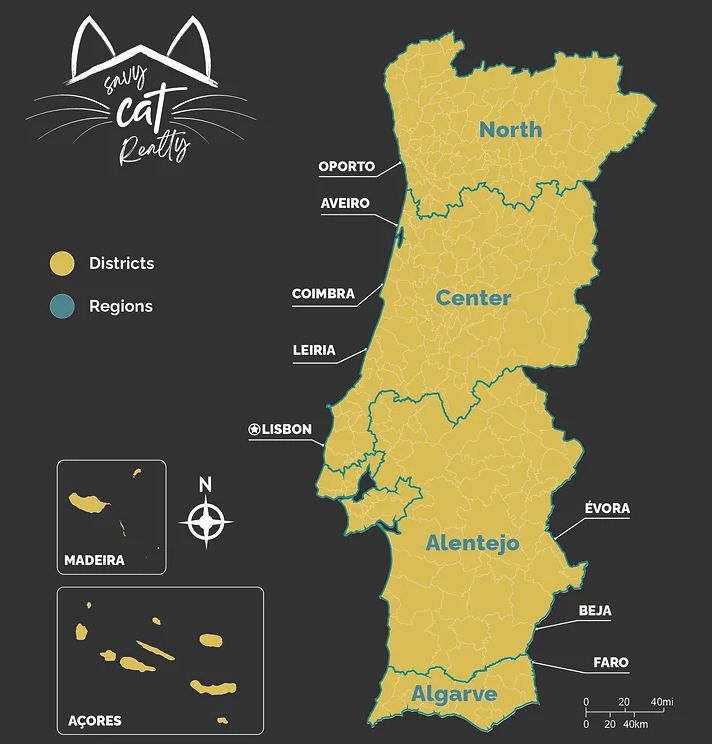
10 Expats' Misconceptions about Portugal
When planning to move abroad, the process always starts with online research.
You know the drill: YouTube videos about relocation, Expat forums and Facebook ex-pat groups, etc. While they all offer great and valuable information, sometimes you must remind yourself that a lot of the information you read is from ex-pats TO ex-pats, and there are just some things you can only learn from your own personal experience of our country and culture.
Sometimes reality can be a bit of a “slap in the face”, other times it can exceed your expectations for the better.
In order to ease out a bit of the cultural clash of what you read online vs reality, Savvy Cat Realty has compiled 10 Expats' Misconceptions about Portugal.
Article by Savvy Cat - Official Buyers Agent Partner to KipperTree
01. Portugal Regional Divisions
This one is something that is very confusing to the vast majority of Portuguese people. The ex-pat community has divided our country in a very creative way:
Silver Coast
Golden Coast
Green Coast
Most Portuguese people do not know these terms unless they’ve worked closely with ex-pats or are in the Tourism profession. The reality is that if you were to use these terms with a local, they will not know what you’re talking about.
Even amongst foreigners, there seems to be different approaches to what these terms encompass. For example, some foreigners consider the “Silver Coast” to be the coastal area right above Lisbon until Porto, while others view the “Silver Coast” as the whole western coastal area, from the North to the Alentejo coast. So there seems to be some confusion and inconsistency among the ex-pat community as well.
The way Portugal is actually divided and how all Portuguese folk see it is represented in the following map;

As you can see there’s the general division with 5 main areas: North, Center, Lisbon, Alentejo and Algarve.
In a more detailed version, we divide it into 11 regions: Minho, Trás-dos-Montes e Alto Douro, Douro, Beira Litoral, Beira Alta, Beira Baixa, Estremadura, Ribatejo, Alto Alentejo, Baixo Alentejo and Algarve.
02. Cold North, Hot South?
There is some truth to that but it’s not as extreme as some expats come to expect.
Sure, in the Algarve and Alentejo regions the average temperature is higher than in the North region, but overall Portugal does have a pretty mild climate. Temperatures generally don’t go too high or too low here.
Usually, only Alentejo and the Interior region showcase higher temperatures during the Summer months compared to the rest of the country. However, during the rest of the year, there isn’t much of a difference.
During the Winter months, the colder temperatures are still a lot milder than in some other countries in the North Hemisphere. For example, it rarely reaches below 0 Celsius here, except in some regions in the North-Interior, but even then it doesn’t go too low (usually goes as down as -10ºC at most). The average lower temperature in Portugal is somewhere between 5ºC to 10ºC.
When it comes to snow, you most likely won’t see snow unless you go to higher altitude regions like Serra da Estrela (the highest altitude mountain range in Portugal) and less frequently in regions like Guarda or other North-Interior regions.
03. Insulation
Speaking of temperatures in Portugal, one thing you might notice in most Portuguese houses is that we have very bad insulation conditions.
In countries like the US or most Northern European countries, you will definitely have a very comfortable interior living as houses will most certainly be climatized with temperature control. I mean, they have to be in order to protect themselves from the extreme cold, right?
Well in Portugal, expect to not have any of that. At least, in older houses/apartments. Recently renovated houses and in places with a higher expatriate population, we do find that the trend is changing and some places now (fortunately) now have proper insulation systems. Nonetheless, most places still don’t have a good climatized system and rely on heaters in the Winter and fans for the Summer.
04. Customer Service
Nowadays, foreigners are sold this idea of Portugal being this “paradise-like” country with warm welcoming locals and everything running smoothly. This is one of the cases where reality can really be a bit of a “slap in the face”, for those who believe this entirely.
Portugal has a bit of a negative mentality, in general. There is a saying here that goes “You’re only a thief if you get caught”, which can be a perfect analogy to some of our corrupt politicians and system.
At the same time, we love to complain a lot while doing absolutely nothing to change things, so there’s this “can’t-do” attitude towards pretty much everything. This type of attitude is something you will certainly experience here, especially in customer service, although it’s most notably present in Public Services.
Besides the fact that dealing with these services is an absolute nightmare, the insane waiting times and slow services really are the cherry on top of this extremely frustrating mix.
Another thing to keep in mind is that customs in Portugal tend to over-charge to release a product you shipped here from outside Europe. Not to mention that you will still have to wait an eternity until you actually get it. Unless you absolutely need something coming from outside of Europe, we always recommend looking for alternative shipping from a European country.
05. Timeframes & paperwork
This point is pretty much a follow-up to the previous one.
Bureaucracy and paperwork are always a pain no matter where you come from, but in Portugal we really seem to like to make things extra complicated for everyone!
One reason for all the slow processing of things is that our Public Services are severely understaffed, which adding to the overly-bureaucratic processes will leave anyone feeling very frustrated.
The “can’t-do” attitude we mentioned before is very latent here because there are very few consequences for public employees.
06. Portuguese language
Not really a misconception as it’s pretty much common knowledge that Portuguese is a very hard language to learn. Albeit definitely not impossible to learn but it does get a bit complicated especially when you don’t have the basic grammatical knowledge. Portuguese and English are based on different Indo-European languages: one comes from the Latin family and the other from the Germanic family, so obviously the foundation of these two languages will differ considerably.
Why then include the Portuguese language in this list?
Because if you are actively trying to learn Portuguese, you might find yourself with some difficulties in practising in “real life”. That’s because Portugal has one of the highest English proficiency levels in the world, as we are currently ranked 7th in the EF English Proficiency Index published in 2021 (https://www.ef.edu.pt/epi/). This means that most Portuguese people will most likely speak to you in English if they see you are struggling with our language or if they notice your accent.
Thus, creating a bit of a double-edged sword since it’s wonderful that we know English and that we are comfortable enough to communicate with you better, but at the same time, if you are trying to learn Portuguese, then we may make difficult your real-life practice a bit.
If you have close Portuguese friends or acquaintances, make sure you tell them to speak Portuguese with you!
07. Portugal is cheap
Right off the bat: absolutely not.
The cost of living in Portugal has been rapidly increasing over the years: not just in the real estate market but also from everything from basic amenities, food, gas, etc to utilities like electricity, water, internet access, etc.
It’s becoming increasingly unaffordable to the average Portuguese person, considering that the minimum wage is one of the lowest in Europe.
Now from an expat perspective coming from the US, UK or Northern European countries with higher salaries it might not be expensive at all but to the average Portuguese person it’s becoming unbearable.
08. Portuguese jobs
This point is directly related to the previous one and it doesn’t really apply if you come to Portugal with a salary of your country of origin as you most certainly have a great quality of life.
It is quite unlikely that if you come here to find a Portuguese job you will have a good quality of life with the Portuguese salary, since salaries here are low (like I mentioned, one of the lowest in Europe). Our minimum wage is currently 705€ and the average Portuguese person CANNOT afford to live on their own (even if they earn a bit more than the minimum wage) with the current inflation rate of the Real Estate market, not to mention the inflation rate of basic utilities and amenities. The only affordable living in Portugal is mostly concentrated in the country’s interior, which tends to be isolated villages.
All in all, with a local salary it’s extremely difficult to have a good quality of life.
However, if you are coming with a US or Northern European country salary, you will definitely be able to afford the ever-rising cost of living in Portugal.
09. Tourist prices vs. Local prices
There are some cities in Portugal that will blatantly make clear distinctive prices between tourists and ex-pats and locals.
If prices are too high for locals, going to these tourist areas it’s completely unaffordable.
These locations are definitely made specifically towards tourists and ex-pats and they are particularly easy to spot, as it seems there is a completely different kind of market and “micro-economy” with exaggerated touristic prices.
Some Algarvian cities that have a strong expats community will “fall victim” to these prices.
10. Real Estate market and service
Finally, it cannot go unmentioned the lack of regulation of the real estate market here.
If you are from the US, you may already be familiar with buying and selling agents, which makes perfect sense since there is an obvious conflict of interest in representing both.
In Portugal, it is ridiculously easy to get a real estate license, as there aren't any kind of requirements for verifying the competence of the agent. This leads to a lot of people being misled and ending up making bad deals in buying property.
You should be particularly careful when it comes to renovating because usually the seller/agent will tell you anything to make the sale and to cash in as fast as possible.
For this reason, we cannot stress enough how important it is to have someone on your side, looking out for your interests as well during the process.
That’s what Savvy Cat Realty is all about. We do not push for higher selling prices for higher commissions because our commissions are fixed. Our most important mission is to be our client’s “right hand” and to represent you and your interests as best as possible!
Why start the buying journey on your own in a foreign market to your own? Let’s take this big step together!
https://www.savvycatrealty.com/buying
